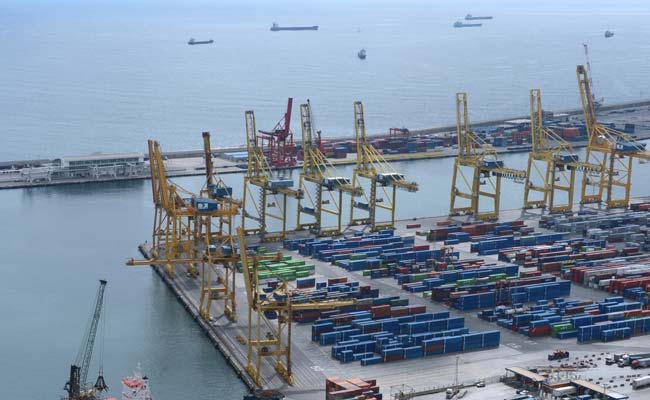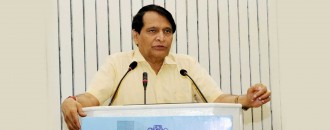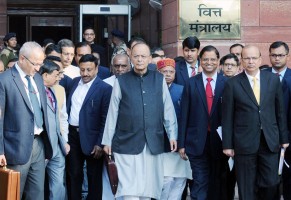
Economic reform an ongoing process than one big event: FIEO Chief
Naveen Kumar| The Dollar Business  Director General and CEO, Federation of Indian Export Organisations (FIEO), Ajay Sahai opined that economic reform has to be an ongoing process rather than one big event. Speaking at a seminar in Delhi on “Say YES to Sustainable MSME’s in India” organized by FIEO for the benefit of exporters, Sahai said, “It was quite an unconventional budget. It’s more a statement of purpose rather than statement on finance. The focus has been put on infrastructure, sustainable development, tax reforms, ease of doing business, eliminating to some extent the parallel economy which is affecting India’s economy in big way.” Sahai went on to add “On ease of doing business, the government is quite conscious because our ranking of 142 hardly justifies the investments that we are looking for. A good beginning has been made for acceptance of digital signature in the form of invoice for central excise and I am sure in months to come it would be extended to shipping documents also.” Talking about other favourable measures being taken by the government he added “There is a move going on to reduce the documents needed for export and import. We have been given to understand that instead of 7 mandatory export documents government is reducing it to three and for imports also instead of 9 it would 3 or 4.” On the matter of sops and incentives for exports the overall feeling expressed by many speakers at the seminar was that the budget has not brought something which could enthuse the exporting fraternity in India. However there were some indirect benefits which were highlighted by several speakers. Exporters were sensitized about the various ways they can reduce their currency risk by hedging through currency ‘Forward’ and ‘Option’ contracts offered by banks. Nitin Gupta, Vice President, Transaction Banking, Yes Bank while emphasizing on the importance of currency risk management said “Majority of the institutions in the Indian market are not promoting ‘Option’ as a product though these are equally beneficial. In a layman term in ‘Option’ we have an insurance wherein for exporters we cap the downside of INR. Similarly, for importer we cap the upside of INR so the benefit will be completely yours.” Exporters who are prone to volatility in currency and many times suffer due to adverse currency movement found the session to be useful in managing this risk. Apart from this exporters learnt about the various finance options which they can use in various scenarios be it pre-shipment or post shipment finance. They were also informed how they can reduce their finance cost by using the ‘Swap’ by keeping the export receivables as underlying. Apart from discussion on takeaways on budget other topics covered were currency risk management, trade finance and sustainable business processes. Most of the speakers appreciated the government’s focus on infrastructure and its initiative to revive the growth by public spending especially through railways. There was also a session on industrial hazards and safety management which showed that how a hazard can turn into accident and cost heavily to a business. The theme of this session was to highlight the importance of reduction of such hazards through hygiene and safety measures and molding the business processes in such way as it works in an environment friendly manner.
Director General and CEO, Federation of Indian Export Organisations (FIEO), Ajay Sahai opined that economic reform has to be an ongoing process rather than one big event. Speaking at a seminar in Delhi on “Say YES to Sustainable MSME’s in India” organized by FIEO for the benefit of exporters, Sahai said, “It was quite an unconventional budget. It’s more a statement of purpose rather than statement on finance. The focus has been put on infrastructure, sustainable development, tax reforms, ease of doing business, eliminating to some extent the parallel economy which is affecting India’s economy in big way.” Sahai went on to add “On ease of doing business, the government is quite conscious because our ranking of 142 hardly justifies the investments that we are looking for. A good beginning has been made for acceptance of digital signature in the form of invoice for central excise and I am sure in months to come it would be extended to shipping documents also.” Talking about other favourable measures being taken by the government he added “There is a move going on to reduce the documents needed for export and import. We have been given to understand that instead of 7 mandatory export documents government is reducing it to three and for imports also instead of 9 it would 3 or 4.” On the matter of sops and incentives for exports the overall feeling expressed by many speakers at the seminar was that the budget has not brought something which could enthuse the exporting fraternity in India. However there were some indirect benefits which were highlighted by several speakers. Exporters were sensitized about the various ways they can reduce their currency risk by hedging through currency ‘Forward’ and ‘Option’ contracts offered by banks. Nitin Gupta, Vice President, Transaction Banking, Yes Bank while emphasizing on the importance of currency risk management said “Majority of the institutions in the Indian market are not promoting ‘Option’ as a product though these are equally beneficial. In a layman term in ‘Option’ we have an insurance wherein for exporters we cap the downside of INR. Similarly, for importer we cap the upside of INR so the benefit will be completely yours.” Exporters who are prone to volatility in currency and many times suffer due to adverse currency movement found the session to be useful in managing this risk. Apart from this exporters learnt about the various finance options which they can use in various scenarios be it pre-shipment or post shipment finance. They were also informed how they can reduce their finance cost by using the ‘Swap’ by keeping the export receivables as underlying. Apart from discussion on takeaways on budget other topics covered were currency risk management, trade finance and sustainable business processes. Most of the speakers appreciated the government’s focus on infrastructure and its initiative to revive the growth by public spending especially through railways. There was also a session on industrial hazards and safety management which showed that how a hazard can turn into accident and cost heavily to a business. The theme of this session was to highlight the importance of reduction of such hazards through hygiene and safety measures and molding the business processes in such way as it works in an environment friendly manner.
This article was published on March 05, 2015.





 to success.
to success.